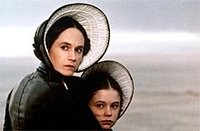Jane Campion's The Piano is one of those rare, wonderful films that not only stands up to repeated viewings, but it gets better every time, never losing its power but somehow building on it. The infamous 'finger' scene is, on first viewing, perhaps simply sickening, but on a third I found it deeply unsettling, and a rapidly-following fourth viewing led me to actually weep while I watched it. Campion takes the traditional genre of a melodrama, or perhaps more specifically a 'woman's picture', and bends it, almost pulling a veil over your eyes, so that it's never really recognisable as such. Her dextrous visual style makes the film flow with an unsettling lucidity, both fitting in and standing incongruously with the narrative. Campion has said that she wanted the film to seem as if it were taking place underwater- hence the moody blue-green photography, but the sense of drowning is a constant one, as Holly Hunter's Ada McGrath tries to surface from the barren, dull landscape of the muddy New Zealand hills and her marriage to the simply-minded Sam Neill, whose failing to understand Ada's relationship to both her piano and her daughter (Anna Paquin) proves to be his undoing. If the stereotyping of the Aboriginals perhaps seems a bit racist, look again: yes, Campion's script does paint them as naive, inexperienced foreigners, but then this is a film from the perspective of the colonizers, not the colonized- to Ada, and indeed Neill's Stewart, the Aboriginals are strange and perhaps stupid, but at least they fit blissfully into the nature around them, something Ada struggles valiantly to do and that Stewart is so jealous of, perhaps, or more fittingly unable to comprehend, that he cuts it down and builds barriers within it. I, for one, know I love a film when I can pick out specific moments of performance or visual style that I love: here, I love the way the square-on camera loses its breath along with Ada when Stewart jumps out from behind a tree; I love Paquin's fiery delivery of the line "To hell!"; I love Paquin's galling sobs after the 'finger' scene; I love Hunter's smile to herself when Baines (Harvey Keitel) walks out of the village hall;... . The performances of The Piano are so deeply seated within it, so different in style yet so perfectly fit together; the style is creepily moody yet beautifully flowing; the music is rythmic yet unsettled; everything about it might seem initially unwielding, but Campion weaves a beautiful tapestry out of all these different elements, creating a film that is at once deeply haunting and deeply satisfying. It leave you with the idea that in the days, like Ada, you will feel happy and contented with it; but at night, when only the darkness surrounds you, you will be haunted by the unease of the film, the complexities of its emotion, and the contradictions seeping through its every pore. Grade: A


No comments:
Post a Comment